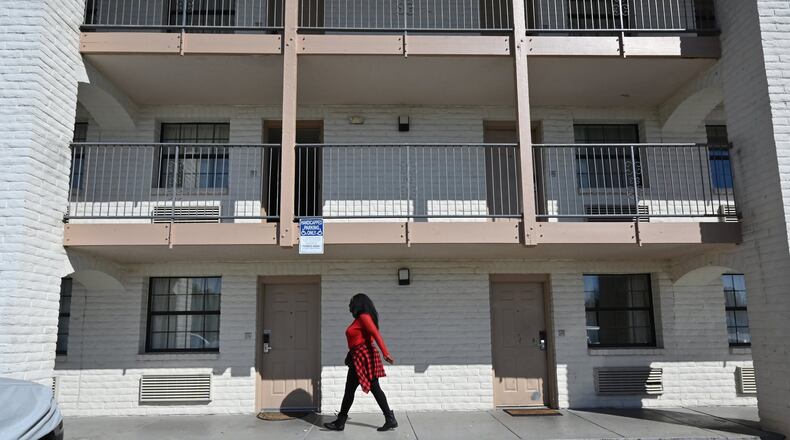The virus-linked economic chill has pushed many residents of extended stay motels to the brink of homelessness.
With thousands of families in metro Atlanta living in motels — often scraping to get by on low-wage jobs — the recent wave of layoffs and lockdowns has taken away the paychecks that made it possible.
“I am just not able to work,” said Wendy Shadburne, 39, who lives with her 10-year-old son in an Intown Suites in Norcross, which costs $240 a week. “I was a bus monitor for the Gwinnett County Schools. But now the schools are closed.”
An emergency fund from St. Vincent de Paul of Georgia on Friday paid her bill for the week, so she won't be evicted right away. But she is worried about the future.
“They say the schools will be open April 24,” she said. “But I’m thinking it is going to be closed the rest of the year.”
Some families end up in motels because they had financial problems and were tagged with low credit ratings that get them rejected by apartment landlords. Some go to the motels as a stop-gap and get stuck there.
While there are no hard data, social agencies and local officials say that up to 30,000 working families in metro Atlanta are living in hotels, generally paying by the week.
Four of 10 metro Atlanta workers make less than $15.40 an hour, many in jobs with part-time hours. When they land in extended stay motels, they often scrape to get by.
The federal government has moved to prevent — at least temporarily — evictions of renters and foreclosures of homeowners who cannot make monthly payments.
There has been no parallel protection for someone living in a motel.
But on Friday, Congress passed and President Trump signed a monumental spending package aimed at easing the economic burden of measures taken to slow the spread of the virus. Included in the $2.2 trillion bill were a series of payments to laid-off workers, as well as one-time checks to nearly all Americans.
That means that many of the extended stay residents will have some money, but not for several weeks at best. Residents of several motels say they have asked for extensions, but haven’t heard from management.
A 55-year-old construction worker said he has been living in an extended stay motel in Marietta for nearly three years. The worker, who declined to give his name for fear of retribution, said he has been paying $270 a week.
“It’s due now,” he said. “But my job is shut down for at least two weeks.”
An eviction would mean sleeping in a car, he said. “What else can I do?”
Red Roof Inn, which owns HomeTowne Studios, said late Friday through a spokeswoman that it would not comment on the issue.
Spokesmen for Intown Suites and Extended Stay America did not respond to requests for comment.
Sonya Brock, 59, who has been living in an Extended Stay America in Marietta since October, said she will owe her $330-a-week payment on Tuesday.
A former truck driver, she’s been driving for Lyft and doing well, she said. “I was going good up to last Monday. Then I went from here to Smyrna and didn’t get anybody. Almost everything is closed up.”
She hopes the company can just let that deadline slide a little, she said. “It’s not like I don’t want to pay.”
For the residents on the edge, there is a last line of defense, said Lindsey Siegel, senior attorney at the Atlanta Legal Aid Society in DeKalb, which has several clients in extended stay motels.
Once a resident has been in a motel for 90 consecutive days, the law eliminates the occupancy tax, she said.
Legal Aid has argued successfully in at least some court cases that once the motel is not paying that tax, those people are no longer guests, they are tenants, Siegel said.
That would mean a motel must go to court for an eviction notice, she said. “The police departments should err on the side of preserving a tenant’s right to the judicial process, especially during a public health crisis.”
About the Author
Keep Reading
The Latest
Featured




